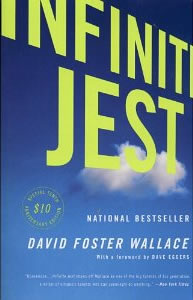Book Notes
 David Foster Wallace, Infinite Jest (New York: Little, Brown, 1996), 1079pp.
David Foster Wallace, Infinite Jest (New York: Little, Brown, 1996), 1079pp.
When David Foster Wallace's editor received the first 400 pages of Infinite Jest, he compared it to a piece of glass dropped from a great height. The crazy complexity of the 1100-page story makes it hard to describe. In Infinite Jest, time is subsidized by corporations, as in the "Year of the Tucks Medicated Pad." A terrorist group from Quebec called the "Wheelchair Assassins" wants to attack the United States with a film that's so powerfully entertaining that "whoever saw it wanted nothing else ever in life but to see it again, and then again, and so on." Some passages make you laugh out loud, others stymie you, single paragraphs run on for pages, and the infamous 388 footnotes themselves can have footnotes. The novel explores numerous aspects of American culture — national character, information overload (which the book mimics), suicide, and addiction to drugs, entertainment, and pleasure.
In numerous interviews Wallace said that he intended to write a book about sadness. The themes of addiction and entertainment for which the book is justly famous are really only vectors of sadness and loneliness. Wallace's biographer DT Max says that Infinite Jest is "a story of people in pain." It has a "very quiet but very sturdy and constant tragic undercurrent," writes novelist Dave Eggers, "that concerns a people who are completely lost, who are lost within their families and lost within their nation, and lost within their time, and who only want some sort of direction or purpose or sense of community or love." Wallace often said that he intended his fiction to explore what it means to live a life of human wholeness in a culture obsessed with individual choice, putative freedom, and rabid individualism, all of which result in a loss of purpose or ability to give yourself to something Bigger.
Joelle Van Dyne, for example, a.k.a. Madame Psychosis, is a member of the "Union of the Hideously and Improbably Deformed," whose members wear veils to hide their shame. A failed suicide attempt lands her in Ennet House, a drug and alcohol halfway house. There she meets Don Gately, a former criminal, recovering addict, and current staffer at Ennet House. He's also the only person in a cast of 200-plus characters who's found a way beyond psychic carnage to genuine healing — but not in a way that you'd expect. Gately is committed to the AA program, but it drives him crazy. He hates the "corny slogans and saccharine grins and hideous coffee," the "limply improbable cliched drivel," the "goopy sentiment," the cultish "brainwashy elements," and the smug "psychobabbly" jargon — which is "probably just Unitarian happy horseshit." But if you Hang In, and Keep Coming, Gately found, you discover "that the thing actually does seem to work. Does keep you Substance-free. It's improbable and shocking."
Gately discovered that the trite can be true. "How do trite things get to be true? Why is the truth usually not just un- but ANTI-interesting? Because every one of the seminal little mini-epiphanies you have in early AA is always polyesterishly banal." But experiencing the true within the trite is only for people who out of desperation learn to Keep It Simple and Ask For Help. With his own thirty years of clinical depression, drug addiction, psychiatric hospitalizations, drug regimens, and AA experience, the novel tracks Wallace's real life movement from irony to sincerity.
The addicts at Ennet House distrust pretension and abstraction. They detest any effort to impress or attempt to perform. They can smell a fake a mile away. "Gately's found it's got to be the truth, is the thing. The thing is it has to be the truth to really go over, here. It can't be a calculated crowd-pleaser, and it has to be the truth unslanted, unfortified. And maximally unironic. An ironist in a Boston AA meeting is a witch in church. Irony-free zone. Same with sly disingenuous manipulative pseudo-sincerity. Sincerity with an ulterior motive is something these tough ravaged people know and fear, all of them trained to remember the coyly sincere, ironic, self-presenting fortifications they'd had to construct in order to carry on Out There." But as Don Gately learned, if you're willing to move from clever sophistication to genuine sincerity, "You're encouraged to keep saying stuff like this until you start to believe it."
In the end, Wallace became what Max calls a "full-fledged apostle of sincerity." The cliches of recovery supplant the technical jargon of literary theory. Sincerity replaced irony as a virtue, and "saying what you meant became a calling." Of course, this risks the condescension of the cultural ironists. At the end of his biography, Max makes a provocative comparison between Dostoevsky and Wallace (who was never religious): "Like 'the good old Brothers K,' as Wallace called Dostoevsky's novel, Infinite Jest counter poses sincerity and faith against moral lassitude. Both eschew stylish irony to make a simple point: faith matters" (288).
Dan Clendenin: dan@journeywithjesus.net


